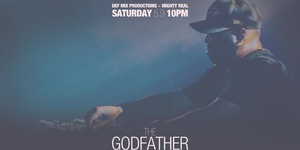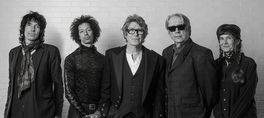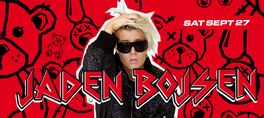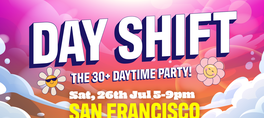Sat May 9, 2015
The Godfather: Frankie Knuckles Tribute w/ Hector Romero & Quentin Harris
SEE EVENT DETAILS
On Saturday, May 9th Mighty Real presents "The Godfather", a tribute to Frankie Knuckles known as the Godfather of house music. Headlining the event will be Frankie Knuckles Defmix mates and BFF's Hector Romero and Quentin Harris, along w/ Mighty Real resident David Harness. Proceeds from the evening will go to the Frankie Knuckles fund established by Sir Elton John.
Quentin Harris:
In the hermetically sealed world of dance music, where genres split tangentially with regular and bewildering regularity, there are a few whose music is expansive enough to cross barriers, ignore micro-idioms and appeal to many. Quentin Harris IS one of the few.
“I’m proud of the fact I wake up each morning to a job that I love doing; one that touches people in so many different ways,” states Quentin. Indeed he does. Quentin’s name has been on the lips of many since hearing his midas touch on Donnie’s “Cloud 9″ and hearing his original productions, like the timeless “Let’s Be Young,” which blew up over five years ago. Since then it’s been an endless whirl of global DJing engagements and many hours acquiring a studio tan in the service of some of the best house music to be heard in quite some time. Some say he single-handedly rejuvenated the house music scene.
Although he’s made his mark in the past decade, Quentin Harris has been making music much longer. Raised in Detroit, he cut his teeth listening to the highly influential DJ Ken Collier (a regular ally of Was (Not Was)) and, of course, The Electrifyin’ Mojo, the Motor City’s equivalent of the UK’s John Peel. “I so wish radio was still like it was then. It was programming to de-programming, so to speak. I would sit there getting schooled on stuff I didn’t know and sometimes he would just play Stevie Wonder records all night.”
Quentin was something of prodigy as a kid, teaching himself to play piano to such a level that, by the time he was able to take lessons, he’d already outgrown the teachers themselves. The route to the studio came through an uncle who fancied himself as an MC and enrolled the kid with the musical chops in the venture. “We went to this little studio and I’d play little synth lines on these demos. I went so often that I ended up controlling how they sounded. At the time, I didn’t realize that I was performing the functions of a music producer. Once that stopped, I had the bug to make my own music.”
Next up, an interning gig at Anita Baker-producer Michael Powell’s Vanguard Studios enabled Quentin to develop his R&B skills playing for music legends such as Aretha Franklin. At home, furiously working on beats, he was noticed by NY MCs Masterminds, who loved what he did and used some of his tracks on their debut. “Working with Masterminds is what caused me to start visiting New York a lot. I ended up producing the whole of their next album. One day, they said, ‘Do you DJ?’ ‘Yes I do.’ They needed a touring DJ. I never looked back after that.”
Despite his burgeoning rep in hip hop circles, Quentin had long been messing about with four-to-the-floor stuff in his studio, undeterred by the occasional negative comment. “When I let people who I admired hear what I was working on, they’d say, ‘Oh it’s not clean or it has to sound like this.’ So I thought, ‘Oh, fuck this shit, there are too many rules in this game. I’ll stick to hip hop!” He laughs uproariously at the memory.
In 2003, his remix of Donnie’s “Cloud 9″ on Giant Step broke through. Within a year he’d made the era-defining “Let’s Be Young”, a tune born out of anger (you can hear it in those sabre-like techno stabs). “A friend had booked flights to Miami, but booked the hotel on the right day in the wrong month. Instead of getting angry I just said, ‘You fix this right now,’ and then I started working on something. “Let’s Be Young” is what came out. That same friend thought it was amazing and different and I was like, ‘Ok whatever.’ But you never know. Quincy Jones thought Michael Jackson should remove Billie Jean from the Thriller album!”
Quentin Harris has become one of the most in-demand remixers in the world, adding necessary club sheen to R&B vocals, house tracks and frequently turning the proverbial turd into a polished diamond. No wonder he’s been called on to remix everyone from Justin Timberlake and Mariah Carey to Femi Kuti and Blaze. In addition to “Don’t You Forget About Us” from Mariah, and “Not Like Crazy” by Jill Scott, one of his benchmark rubs was a sneaky re-production of Leela James’ “My Joy”, transforming her dynamite blues jam, into classic deep house. He says he never thought it would cause such a splash. “I had no idea that “My Joy” would turn into what it turned into. The records I really loved and had the most fun working on, like Justin Timberlake’s “What Goes Around,”, stayed under the radar. You know, I never know. I just do what feels good.”
This May sees the release of his sophomore album, “Sac•ri•fice”, the follow-up to 2006’s “No Politics”, a collection that encompasses Harris’ widescreen house vista. “It’s taken me two years to make “Sac•ri•fice,” he confides. “There was a year of frustration because of writers’ block and also, I was hearing a lot of records that I felt were copying my sounds and I was challenged with trying to come up with something new without alienating my fan base. I hope I’ve succeeded. If I had to describe “Sac•ri•fice” sonically, I would say that it sounds like the album Prince, Murk and I would make together, if such a dream session should ever happen.”
Harris’ success has been built on the rare ability to straddle genres effortlessly, with productions that gracefully sit between the soulful end of the Shelter and the tougher sound that many European audiences demand. Danny Tenaglia called it Hard and Soul and Quentin surely lives up to it. “I go out and listen to everything even if it’s not my scene,” he states. “For instance, Victor Calderone is a good friend of mine – and even though I won’t necessarily love everything he plays, I do think it’s important to go out and hear him play. I love to go and get out on the floor with the crowd; not hang out in the booth. When I hear a record and it really really catches my attention, I get crazy about it, and then I’m like, Ok that’s the record of the night for me, I’m gonna go and find out what it is and then go home.”
That polymath approach to music would surprise few who have heard Quentin’s studio output or his extended live sets. Whether he’s wowing crowds in Ibiza with a dose of Leela James or delving deep into his creative reserves for another genre-defying re-production, Quentin Harris is the man who can. No politics, no doubt.
Hector Romero:
Hector’s intro into the DJ world began at the age of 13. Nicknamed “DJ Baby Hec,” the Bronx native landed his first job at La Mirage, known at the time as one of the hottest dance clubs in the Bronx. Hector was soon spinning at a number of downtown Manhattan clubs including Save the Robots, Palladium and Roxy as well as The Red Zone where he opened for David Morales. Hector spends a great deal of time travelling and DJ’ing around the world. He can be found stirring up the dance floors in Italy, Greece, Tokyo and Spain and considers Stereo in Montreal his home enjoying a quarterly residency.
Hector participates and oversees numerous radio and internet music stations. He is the resident DJ for Def Mix Radio, a monthly Podcast featured on iTunes and Def Mix.com. He is frequently a guest on Paris’ FG radio subbing for Morales while holding down a monthly spot on Italy’s Radio 105. . Each show contains quality house music from around the globe and will feature guest DJ’s as well as fellow Def Mixers David Morales and Frankie Knuckles.
Hector’s music industry experience is not limited to DJing. Early responsibilities included a job in a local record shop eventually leading to a position with Emotive Records. Soon after, he was abducted by David Morales to look after the day-to-day operations of DMI Records. As the current label manager and business partner to Satoshi Tomiie, Hector is the driving force behind SAW.RECORDINGS. Having great success with Chab, Bush II Bush, and Audiofly among others, Hector has earned the respect of DJs and record labels throughout the world. “Since remixing and producing are not my thing, being a ‘Record Man’ is quite fulfilling” says Hector. “But my first love, after of course my wife and daughter, is DJing.”
Hector has been using his talents by stepping into the remixing and production arena. He is collaborating and honing his skills working with numerous established remix producers. His remix of David Morales’ single “Stay” will be released by Ultra Records this spring. We can also expect a King Street compilation to hit the streets before the end of the year.
Hector works hard at his craft ensuring that the clubbers always have a good time. What sets Romero apart from the rest is his ability to reach the masses through his music as well as his personality. Although he describes himself as a DJ with a musical identity crisis, deep down he knows that it’s his diversity and eclectic taste that set him apart from his peers. This is what makes him a favorite with promoters and clubbers alike.
show less
Quentin Harris:
In the hermetically sealed world of dance music, where genres split tangentially with regular and bewildering regularity, there are a few whose music is expansive enough to cross barriers, ignore micro-idioms and appeal to many. Quentin Harris IS one of the few.
“I’m proud of the fact I wake up each morning to a job that I love doing; one that touches people in so many different ways,” states Quentin. Indeed he does. Quentin’s name has been on the lips of many since hearing his midas touch on Donnie’s “Cloud 9″ and hearing his original productions, like the timeless “Let’s Be Young,” which blew up over five years ago. Since then it’s been an endless whirl of global DJing engagements and many hours acquiring a studio tan in the service of some of the best house music to be heard in quite some time. Some say he single-handedly rejuvenated the house music scene.
Although he’s made his mark in the past decade, Quentin Harris has been making music much longer. Raised in Detroit, he cut his teeth listening to the highly influential DJ Ken Collier (a regular ally of Was (Not Was)) and, of course, The Electrifyin’ Mojo, the Motor City’s equivalent of the UK’s John Peel. “I so wish radio was still like it was then. It was programming to de-programming, so to speak. I would sit there getting schooled on stuff I didn’t know and sometimes he would just play Stevie Wonder records all night.”
Quentin was something of prodigy as a kid, teaching himself to play piano to such a level that, by the time he was able to take lessons, he’d already outgrown the teachers themselves. The route to the studio came through an uncle who fancied himself as an MC and enrolled the kid with the musical chops in the venture. “We went to this little studio and I’d play little synth lines on these demos. I went so often that I ended up controlling how they sounded. At the time, I didn’t realize that I was performing the functions of a music producer. Once that stopped, I had the bug to make my own music.”
Next up, an interning gig at Anita Baker-producer Michael Powell’s Vanguard Studios enabled Quentin to develop his R&B skills playing for music legends such as Aretha Franklin. At home, furiously working on beats, he was noticed by NY MCs Masterminds, who loved what he did and used some of his tracks on their debut. “Working with Masterminds is what caused me to start visiting New York a lot. I ended up producing the whole of their next album. One day, they said, ‘Do you DJ?’ ‘Yes I do.’ They needed a touring DJ. I never looked back after that.”
Despite his burgeoning rep in hip hop circles, Quentin had long been messing about with four-to-the-floor stuff in his studio, undeterred by the occasional negative comment. “When I let people who I admired hear what I was working on, they’d say, ‘Oh it’s not clean or it has to sound like this.’ So I thought, ‘Oh, fuck this shit, there are too many rules in this game. I’ll stick to hip hop!” He laughs uproariously at the memory.
In 2003, his remix of Donnie’s “Cloud 9″ on Giant Step broke through. Within a year he’d made the era-defining “Let’s Be Young”, a tune born out of anger (you can hear it in those sabre-like techno stabs). “A friend had booked flights to Miami, but booked the hotel on the right day in the wrong month. Instead of getting angry I just said, ‘You fix this right now,’ and then I started working on something. “Let’s Be Young” is what came out. That same friend thought it was amazing and different and I was like, ‘Ok whatever.’ But you never know. Quincy Jones thought Michael Jackson should remove Billie Jean from the Thriller album!”
Quentin Harris has become one of the most in-demand remixers in the world, adding necessary club sheen to R&B vocals, house tracks and frequently turning the proverbial turd into a polished diamond. No wonder he’s been called on to remix everyone from Justin Timberlake and Mariah Carey to Femi Kuti and Blaze. In addition to “Don’t You Forget About Us” from Mariah, and “Not Like Crazy” by Jill Scott, one of his benchmark rubs was a sneaky re-production of Leela James’ “My Joy”, transforming her dynamite blues jam, into classic deep house. He says he never thought it would cause such a splash. “I had no idea that “My Joy” would turn into what it turned into. The records I really loved and had the most fun working on, like Justin Timberlake’s “What Goes Around,”, stayed under the radar. You know, I never know. I just do what feels good.”
This May sees the release of his sophomore album, “Sac•ri•fice”, the follow-up to 2006’s “No Politics”, a collection that encompasses Harris’ widescreen house vista. “It’s taken me two years to make “Sac•ri•fice,” he confides. “There was a year of frustration because of writers’ block and also, I was hearing a lot of records that I felt were copying my sounds and I was challenged with trying to come up with something new without alienating my fan base. I hope I’ve succeeded. If I had to describe “Sac•ri•fice” sonically, I would say that it sounds like the album Prince, Murk and I would make together, if such a dream session should ever happen.”
Harris’ success has been built on the rare ability to straddle genres effortlessly, with productions that gracefully sit between the soulful end of the Shelter and the tougher sound that many European audiences demand. Danny Tenaglia called it Hard and Soul and Quentin surely lives up to it. “I go out and listen to everything even if it’s not my scene,” he states. “For instance, Victor Calderone is a good friend of mine – and even though I won’t necessarily love everything he plays, I do think it’s important to go out and hear him play. I love to go and get out on the floor with the crowd; not hang out in the booth. When I hear a record and it really really catches my attention, I get crazy about it, and then I’m like, Ok that’s the record of the night for me, I’m gonna go and find out what it is and then go home.”
That polymath approach to music would surprise few who have heard Quentin’s studio output or his extended live sets. Whether he’s wowing crowds in Ibiza with a dose of Leela James or delving deep into his creative reserves for another genre-defying re-production, Quentin Harris is the man who can. No politics, no doubt.
Hector Romero:
Hector’s intro into the DJ world began at the age of 13. Nicknamed “DJ Baby Hec,” the Bronx native landed his first job at La Mirage, known at the time as one of the hottest dance clubs in the Bronx. Hector was soon spinning at a number of downtown Manhattan clubs including Save the Robots, Palladium and Roxy as well as The Red Zone where he opened for David Morales. Hector spends a great deal of time travelling and DJ’ing around the world. He can be found stirring up the dance floors in Italy, Greece, Tokyo and Spain and considers Stereo in Montreal his home enjoying a quarterly residency.
Hector participates and oversees numerous radio and internet music stations. He is the resident DJ for Def Mix Radio, a monthly Podcast featured on iTunes and Def Mix.com. He is frequently a guest on Paris’ FG radio subbing for Morales while holding down a monthly spot on Italy’s Radio 105. . Each show contains quality house music from around the globe and will feature guest DJ’s as well as fellow Def Mixers David Morales and Frankie Knuckles.
Hector’s music industry experience is not limited to DJing. Early responsibilities included a job in a local record shop eventually leading to a position with Emotive Records. Soon after, he was abducted by David Morales to look after the day-to-day operations of DMI Records. As the current label manager and business partner to Satoshi Tomiie, Hector is the driving force behind SAW.RECORDINGS. Having great success with Chab, Bush II Bush, and Audiofly among others, Hector has earned the respect of DJs and record labels throughout the world. “Since remixing and producing are not my thing, being a ‘Record Man’ is quite fulfilling” says Hector. “But my first love, after of course my wife and daughter, is DJing.”
Hector has been using his talents by stepping into the remixing and production arena. He is collaborating and honing his skills working with numerous established remix producers. His remix of David Morales’ single “Stay” will be released by Ultra Records this spring. We can also expect a King Street compilation to hit the streets before the end of the year.
Hector works hard at his craft ensuring that the clubbers always have a good time. What sets Romero apart from the rest is his ability to reach the masses through his music as well as his personality. Although he describes himself as a DJ with a musical identity crisis, deep down he knows that it’s his diversity and eclectic taste that set him apart from his peers. This is what makes him a favorite with promoters and clubbers alike.
On Saturday, May 9th Mighty Real presents "The Godfather", a tribute to Frankie Knuckles known as the Godfather of house music. Headlining the event will be Frankie Knuckles Defmix mates and BFF's Hector Romero and Quentin Harris, along w/ Mighty Real resident David Harness. Proceeds from the evening will go to the Frankie Knuckles fund established by Sir Elton John.
Quentin Harris:
In the hermetically sealed world of dance music, where genres split tangentially with regular and bewildering regularity, there are a few whose music is expansive enough to cross barriers, ignore micro-idioms and appeal to many. Quentin Harris IS one of the few.
“I’m proud of the fact I wake up each morning to a job that I love doing; one that touches people in so many different ways,” states Quentin. Indeed he does. Quentin’s name has been on the lips of many since hearing his midas touch on Donnie’s “Cloud 9″ and hearing his original productions, like the timeless “Let’s Be Young,” which blew up over five years ago. Since then it’s been an endless whirl of global DJing engagements and many hours acquiring a studio tan in the service of some of the best house music to be heard in quite some time. Some say he single-handedly rejuvenated the house music scene.
Although he’s made his mark in the past decade, Quentin Harris has been making music much longer. Raised in Detroit, he cut his teeth listening to the highly influential DJ Ken Collier (a regular ally of Was (Not Was)) and, of course, The Electrifyin’ Mojo, the Motor City’s equivalent of the UK’s John Peel. “I so wish radio was still like it was then. It was programming to de-programming, so to speak. I would sit there getting schooled on stuff I didn’t know and sometimes he would just play Stevie Wonder records all night.”
Quentin was something of prodigy as a kid, teaching himself to play piano to such a level that, by the time he was able to take lessons, he’d already outgrown the teachers themselves. The route to the studio came through an uncle who fancied himself as an MC and enrolled the kid with the musical chops in the venture. “We went to this little studio and I’d play little synth lines on these demos. I went so often that I ended up controlling how they sounded. At the time, I didn’t realize that I was performing the functions of a music producer. Once that stopped, I had the bug to make my own music.”
Next up, an interning gig at Anita Baker-producer Michael Powell’s Vanguard Studios enabled Quentin to develop his R&B skills playing for music legends such as Aretha Franklin. At home, furiously working on beats, he was noticed by NY MCs Masterminds, who loved what he did and used some of his tracks on their debut. “Working with Masterminds is what caused me to start visiting New York a lot. I ended up producing the whole of their next album. One day, they said, ‘Do you DJ?’ ‘Yes I do.’ They needed a touring DJ. I never looked back after that.”
Despite his burgeoning rep in hip hop circles, Quentin had long been messing about with four-to-the-floor stuff in his studio, undeterred by the occasional negative comment. “When I let people who I admired hear what I was working on, they’d say, ‘Oh it’s not clean or it has to sound like this.’ So I thought, ‘Oh, fuck this shit, there are too many rules in this game. I’ll stick to hip hop!” He laughs uproariously at the memory.
In 2003, his remix of Donnie’s “Cloud 9″ on Giant Step broke through. Within a year he’d made the era-defining “Let’s Be Young”, a tune born out of anger (you can hear it in those sabre-like techno stabs). “A friend had booked flights to Miami, but booked the hotel on the right day in the wrong month. Instead of getting angry I just said, ‘You fix this right now,’ and then I started working on something. “Let’s Be Young” is what came out. That same friend thought it was amazing and different and I was like, ‘Ok whatever.’ But you never know. Quincy Jones thought Michael Jackson should remove Billie Jean from the Thriller album!”
Quentin Harris has become one of the most in-demand remixers in the world, adding necessary club sheen to R&B vocals, house tracks and frequently turning the proverbial turd into a polished diamond. No wonder he’s been called on to remix everyone from Justin Timberlake and Mariah Carey to Femi Kuti and Blaze. In addition to “Don’t You Forget About Us” from Mariah, and “Not Like Crazy” by Jill Scott, one of his benchmark rubs was a sneaky re-production of Leela James’ “My Joy”, transforming her dynamite blues jam, into classic deep house. He says he never thought it would cause such a splash. “I had no idea that “My Joy” would turn into what it turned into. The records I really loved and had the most fun working on, like Justin Timberlake’s “What Goes Around,”, stayed under the radar. You know, I never know. I just do what feels good.”
This May sees the release of his sophomore album, “Sac•ri•fice”, the follow-up to 2006’s “No Politics”, a collection that encompasses Harris’ widescreen house vista. “It’s taken me two years to make “Sac•ri•fice,” he confides. “There was a year of frustration because of writers’ block and also, I was hearing a lot of records that I felt were copying my sounds and I was challenged with trying to come up with something new without alienating my fan base. I hope I’ve succeeded. If I had to describe “Sac•ri•fice” sonically, I would say that it sounds like the album Prince, Murk and I would make together, if such a dream session should ever happen.”
Harris’ success has been built on the rare ability to straddle genres effortlessly, with productions that gracefully sit between the soulful end of the Shelter and the tougher sound that many European audiences demand. Danny Tenaglia called it Hard and Soul and Quentin surely lives up to it. “I go out and listen to everything even if it’s not my scene,” he states. “For instance, Victor Calderone is a good friend of mine – and even though I won’t necessarily love everything he plays, I do think it’s important to go out and hear him play. I love to go and get out on the floor with the crowd; not hang out in the booth. When I hear a record and it really really catches my attention, I get crazy about it, and then I’m like, Ok that’s the record of the night for me, I’m gonna go and find out what it is and then go home.”
That polymath approach to music would surprise few who have heard Quentin’s studio output or his extended live sets. Whether he’s wowing crowds in Ibiza with a dose of Leela James or delving deep into his creative reserves for another genre-defying re-production, Quentin Harris is the man who can. No politics, no doubt.
Hector Romero:
Hector’s intro into the DJ world began at the age of 13. Nicknamed “DJ Baby Hec,” the Bronx native landed his first job at La Mirage, known at the time as one of the hottest dance clubs in the Bronx. Hector was soon spinning at a number of downtown Manhattan clubs including Save the Robots, Palladium and Roxy as well as The Red Zone where he opened for David Morales. Hector spends a great deal of time travelling and DJ’ing around the world. He can be found stirring up the dance floors in Italy, Greece, Tokyo and Spain and considers Stereo in Montreal his home enjoying a quarterly residency.
Hector participates and oversees numerous radio and internet music stations. He is the resident DJ for Def Mix Radio, a monthly Podcast featured on iTunes and Def Mix.com. He is frequently a guest on Paris’ FG radio subbing for Morales while holding down a monthly spot on Italy’s Radio 105. . Each show contains quality house music from around the globe and will feature guest DJ’s as well as fellow Def Mixers David Morales and Frankie Knuckles.
Hector’s music industry experience is not limited to DJing. Early responsibilities included a job in a local record shop eventually leading to a position with Emotive Records. Soon after, he was abducted by David Morales to look after the day-to-day operations of DMI Records. As the current label manager and business partner to Satoshi Tomiie, Hector is the driving force behind SAW.RECORDINGS. Having great success with Chab, Bush II Bush, and Audiofly among others, Hector has earned the respect of DJs and record labels throughout the world. “Since remixing and producing are not my thing, being a ‘Record Man’ is quite fulfilling” says Hector. “But my first love, after of course my wife and daughter, is DJing.”
Hector has been using his talents by stepping into the remixing and production arena. He is collaborating and honing his skills working with numerous established remix producers. His remix of David Morales’ single “Stay” will be released by Ultra Records this spring. We can also expect a King Street compilation to hit the streets before the end of the year.
Hector works hard at his craft ensuring that the clubbers always have a good time. What sets Romero apart from the rest is his ability to reach the masses through his music as well as his personality. Although he describes himself as a DJ with a musical identity crisis, deep down he knows that it’s his diversity and eclectic taste that set him apart from his peers. This is what makes him a favorite with promoters and clubbers alike.
read more
Quentin Harris:
In the hermetically sealed world of dance music, where genres split tangentially with regular and bewildering regularity, there are a few whose music is expansive enough to cross barriers, ignore micro-idioms and appeal to many. Quentin Harris IS one of the few.
“I’m proud of the fact I wake up each morning to a job that I love doing; one that touches people in so many different ways,” states Quentin. Indeed he does. Quentin’s name has been on the lips of many since hearing his midas touch on Donnie’s “Cloud 9″ and hearing his original productions, like the timeless “Let’s Be Young,” which blew up over five years ago. Since then it’s been an endless whirl of global DJing engagements and many hours acquiring a studio tan in the service of some of the best house music to be heard in quite some time. Some say he single-handedly rejuvenated the house music scene.
Although he’s made his mark in the past decade, Quentin Harris has been making music much longer. Raised in Detroit, he cut his teeth listening to the highly influential DJ Ken Collier (a regular ally of Was (Not Was)) and, of course, The Electrifyin’ Mojo, the Motor City’s equivalent of the UK’s John Peel. “I so wish radio was still like it was then. It was programming to de-programming, so to speak. I would sit there getting schooled on stuff I didn’t know and sometimes he would just play Stevie Wonder records all night.”
Quentin was something of prodigy as a kid, teaching himself to play piano to such a level that, by the time he was able to take lessons, he’d already outgrown the teachers themselves. The route to the studio came through an uncle who fancied himself as an MC and enrolled the kid with the musical chops in the venture. “We went to this little studio and I’d play little synth lines on these demos. I went so often that I ended up controlling how they sounded. At the time, I didn’t realize that I was performing the functions of a music producer. Once that stopped, I had the bug to make my own music.”
Next up, an interning gig at Anita Baker-producer Michael Powell’s Vanguard Studios enabled Quentin to develop his R&B skills playing for music legends such as Aretha Franklin. At home, furiously working on beats, he was noticed by NY MCs Masterminds, who loved what he did and used some of his tracks on their debut. “Working with Masterminds is what caused me to start visiting New York a lot. I ended up producing the whole of their next album. One day, they said, ‘Do you DJ?’ ‘Yes I do.’ They needed a touring DJ. I never looked back after that.”
Despite his burgeoning rep in hip hop circles, Quentin had long been messing about with four-to-the-floor stuff in his studio, undeterred by the occasional negative comment. “When I let people who I admired hear what I was working on, they’d say, ‘Oh it’s not clean or it has to sound like this.’ So I thought, ‘Oh, fuck this shit, there are too many rules in this game. I’ll stick to hip hop!” He laughs uproariously at the memory.
In 2003, his remix of Donnie’s “Cloud 9″ on Giant Step broke through. Within a year he’d made the era-defining “Let’s Be Young”, a tune born out of anger (you can hear it in those sabre-like techno stabs). “A friend had booked flights to Miami, but booked the hotel on the right day in the wrong month. Instead of getting angry I just said, ‘You fix this right now,’ and then I started working on something. “Let’s Be Young” is what came out. That same friend thought it was amazing and different and I was like, ‘Ok whatever.’ But you never know. Quincy Jones thought Michael Jackson should remove Billie Jean from the Thriller album!”
Quentin Harris has become one of the most in-demand remixers in the world, adding necessary club sheen to R&B vocals, house tracks and frequently turning the proverbial turd into a polished diamond. No wonder he’s been called on to remix everyone from Justin Timberlake and Mariah Carey to Femi Kuti and Blaze. In addition to “Don’t You Forget About Us” from Mariah, and “Not Like Crazy” by Jill Scott, one of his benchmark rubs was a sneaky re-production of Leela James’ “My Joy”, transforming her dynamite blues jam, into classic deep house. He says he never thought it would cause such a splash. “I had no idea that “My Joy” would turn into what it turned into. The records I really loved and had the most fun working on, like Justin Timberlake’s “What Goes Around,”, stayed under the radar. You know, I never know. I just do what feels good.”
This May sees the release of his sophomore album, “Sac•ri•fice”, the follow-up to 2006’s “No Politics”, a collection that encompasses Harris’ widescreen house vista. “It’s taken me two years to make “Sac•ri•fice,” he confides. “There was a year of frustration because of writers’ block and also, I was hearing a lot of records that I felt were copying my sounds and I was challenged with trying to come up with something new without alienating my fan base. I hope I’ve succeeded. If I had to describe “Sac•ri•fice” sonically, I would say that it sounds like the album Prince, Murk and I would make together, if such a dream session should ever happen.”
Harris’ success has been built on the rare ability to straddle genres effortlessly, with productions that gracefully sit between the soulful end of the Shelter and the tougher sound that many European audiences demand. Danny Tenaglia called it Hard and Soul and Quentin surely lives up to it. “I go out and listen to everything even if it’s not my scene,” he states. “For instance, Victor Calderone is a good friend of mine – and even though I won’t necessarily love everything he plays, I do think it’s important to go out and hear him play. I love to go and get out on the floor with the crowd; not hang out in the booth. When I hear a record and it really really catches my attention, I get crazy about it, and then I’m like, Ok that’s the record of the night for me, I’m gonna go and find out what it is and then go home.”
That polymath approach to music would surprise few who have heard Quentin’s studio output or his extended live sets. Whether he’s wowing crowds in Ibiza with a dose of Leela James or delving deep into his creative reserves for another genre-defying re-production, Quentin Harris is the man who can. No politics, no doubt.
Hector Romero:
Hector’s intro into the DJ world began at the age of 13. Nicknamed “DJ Baby Hec,” the Bronx native landed his first job at La Mirage, known at the time as one of the hottest dance clubs in the Bronx. Hector was soon spinning at a number of downtown Manhattan clubs including Save the Robots, Palladium and Roxy as well as The Red Zone where he opened for David Morales. Hector spends a great deal of time travelling and DJ’ing around the world. He can be found stirring up the dance floors in Italy, Greece, Tokyo and Spain and considers Stereo in Montreal his home enjoying a quarterly residency.
Hector participates and oversees numerous radio and internet music stations. He is the resident DJ for Def Mix Radio, a monthly Podcast featured on iTunes and Def Mix.com. He is frequently a guest on Paris’ FG radio subbing for Morales while holding down a monthly spot on Italy’s Radio 105. . Each show contains quality house music from around the globe and will feature guest DJ’s as well as fellow Def Mixers David Morales and Frankie Knuckles.
Hector’s music industry experience is not limited to DJing. Early responsibilities included a job in a local record shop eventually leading to a position with Emotive Records. Soon after, he was abducted by David Morales to look after the day-to-day operations of DMI Records. As the current label manager and business partner to Satoshi Tomiie, Hector is the driving force behind SAW.RECORDINGS. Having great success with Chab, Bush II Bush, and Audiofly among others, Hector has earned the respect of DJs and record labels throughout the world. “Since remixing and producing are not my thing, being a ‘Record Man’ is quite fulfilling” says Hector. “But my first love, after of course my wife and daughter, is DJing.”
Hector has been using his talents by stepping into the remixing and production arena. He is collaborating and honing his skills working with numerous established remix producers. His remix of David Morales’ single “Stay” will be released by Ultra Records this spring. We can also expect a King Street compilation to hit the streets before the end of the year.
Hector works hard at his craft ensuring that the clubbers always have a good time. What sets Romero apart from the rest is his ability to reach the masses through his music as well as his personality. Although he describes himself as a DJ with a musical identity crisis, deep down he knows that it’s his diversity and eclectic taste that set him apart from his peers. This is what makes him a favorite with promoters and clubbers alike.
show less
Date/Times:
The Great Northern
13 Upcoming Events
119 Utah Street, San Francisco, CA 94103
The Best Events
Every Week in Your Inbox
From Our Sponsors
UPCOMING EVENTS
Great suggestion! We'll be in touch.
Event reviewed successfully.









